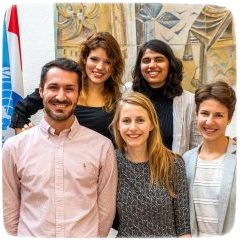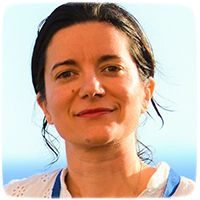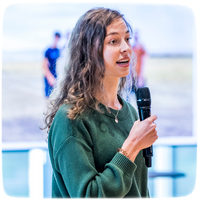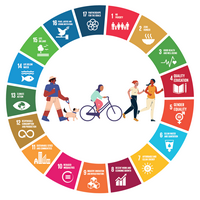 |
Summer Newsletter - Welcome to our third quarterly newsletter of 2021, where we round up the latest news and views on all our research, training and education programmes. Here we look forward to our next 'MEIDE' innovation conference, set for late November 2021. We then look back over recent bulletins, including the release of two flagship reports for UN and EU agencies: the UNESCO Science Report and EU Innovation Scoreboard. Plus news of a best paper award in the Journal of Economic Psychology, and a most outstanding article award in the Canadian Journal of Education. |
|
 |
Upcoming Events - We’ll be co-leading the 12th Conference on 'Model-based Evidence on Innovation and Development' (MEIDE) from 29 November to 1 December 2021, with partners at the Inter-American Development Bank (IDB), and the Formal and Inclusive Economy Alliance. - The scientific committee includes UNU-MERIT’s Fabiana Visentin, Micheline Goedhuys and Pierre Mohnen, as well as PhD alumni Alison Cathles and Fernando Vargas, who now work for the IDB, and Simone Sasso, who is now with the European Commission's Joint Research Centre. - This conference will gather researchers from across Latin America and the Caribbean with colleagues from around the world to discuss various aspects of innovation and its relation to economic development. Submissions are due by 15 October 2021. |
|
 |
Latest News - Back in May, two professors and a Master’s alumna from UNU-MERIT won the RWB Jackson Award 2021, for the most outstanding English-language article in the Canadian Journal of Education. The winning article, 'The Use of a Multidimensional Support Model to Examine Policies and Practices for Immigrant Students across Canada', was co-authored by among others Louis Volante, Camila Lara and Melissa Siegel. Then two weeks later, two of our researchers won this year’s best paper award from the Journal of Economic Psychology. The winning article, ‘Gender attitudes in the Arab region – The role of framing and priming effects’ was co-authored by among others Micheline Goedhuys and Eleonora Nillesen. - Three UNU-MERIT researchers contributed to the latest UNESCO Science Report, released on 11 June 2021. Luc Soete and Hugo Hollanders among others co-authored the chapter on the European Union, while Shuan Sadreghazi wrote the chapter on Iran. In a preface to the 750-page document, UN Secretary-General António Guterres said: “This year’s UNESCO Science Report – the Race Against Time for Smarter Development – focuses on the global shift towards economies that are greener, knowledge-based and make the best use of digital technologies. We must work to ensure that the pursuit of advanced technology and sustainable development go hand in hand." - The European Commission released this year’s European Innovation Scoreboard on 21 June 2021. This flagship report was prepared and coordinated by Hugo Hollanders and Nordine Es-Sadki, with contributions from Adriana Rantcheva. The EU Commissioner for Internal Market, Thierry Breton, said: “European innovations like the technologies at the heart of new COVID-19 vaccines have been crucial to fighting and overcoming the current pandemic. The EU’s improved innovation performance is a very positive signal. Investing in innovation is investing in our ability to be at the technological forefront for a sustainable, digital and resilient economy and society.” |
|
 |
Recent Publications - Does it pay to do ‘novel’ science? Based on applications to a Swiss research funding programme, a new article finds that novel scientists have a higher probability of applying for funds than non-novel scientists, but that on average they receive lower ratings by grant evaluators and have lower chances of being funded. When it comes to learning and innovation, do small firms differ from large ones across India? A new article weighs up formal and informal learning approaches in small and large firms in the capital goods industry. The authors find that informal learning and experience-based innovation is linked to improved performance, particularly among small firms. See more of our June publications, including six working papers, five journal articles and five PhD defences. - Are production activities sustainable along Global Value Chains? A new article, which considers the empirical evidence on social and environmental sustainability, gives ambiguous results. On the one hand, GVCs can lead to sizeable amounts of carbon leakage, as they allow firms to offshore polluting production activities. On the other hand, GVCs make firms more energy and emission efficient than domestic peers, thus dampening overall emission growth. In terms of social sustainability, GVCs are linked to an income premium for workers and producers alike, although these benefits are not equally distributed. Do research and development investments in countries with weak Intellectual Property Rights destroy market value? A new article says that a firm’s market value is indeed likely to be negatively affected, but that firms with internal linkage strategies are able to limit local knowledge outflows. Read all our May publications, including one book, six book chapters and six working papers. How should the ‘Greater Mekong Subregion’ — flowing through Cambodia, China, Laos, Myanmar, Thailand and Viet Nam — close the gap with the world’s most advanced economies? A new report for the Asian Development Bank says the region can improve its prospects by further integrating into the global economy, significantly upgrading production and exports, enabling cities to be engines of growth, and improving road infrastructure and connectivity. How does digital infrastructure affect employment in the services sector across sub-Saharan Africa? A new study covering 45 countries finds that positive effects depend on education, institutional quality and macroeconomic conditions as captured by the inflation rate. In particular, the authors find that positive effects increase in line with institutional quality. See more of our April publications, including 23 journal articles, five working papers and two books. |
|
 |
Application Deadlines - FINAL CALL for EU/EEA nationals: Apply by 15 July 2021 for our UN-sponsored double-degree Master of Science in Public Policy and Human Development, and choose one of seven specialisations. - Apply by 6 August 2021 for the next module in our short course on Evidence-Based Policy Research Methods (EPRM), a programme that trains participants in translating policy issues into research questions before writing and disseminating proposals for evidence-based research. - Apply by 1 October 2021 for our GPAC² part-time PhD programme, a course that meets the needs and availability of working professionals and researchers with full- or part-time jobs, allowing them to combine their careers with obtaining a PhD. |
|
 |
Alumni Activities - Join us at 2pm (CEST) on 28 July 2021 for the third and final lecture in our ‘Study to Work’ summer series. The first two sessions focused on the public and private sectors; our third session will consider lessons learned in the academic sector, with guest speakers Praachi Kumar and Enrico Nichelatti. - Praachi, a 2016 graduate, did the Social Protection specialisation and then worked as a researcher for Plan International. She is now completing her PhD at UNU-MERIT, where she explores the links between digitalisation and violence against women. Enrico, a 2020 graduate, did the Foreign Policy specialisation and now works for our sister institute UNU-WIDER on the economic impact of COVID-19 and the implementation of tax-benefit microsimulation models. He will soon be joining UN Volunteers for a project in Ecuador. - Have you always wanted to know where your old classmates ended up? Are you interested in alumni events in your region? And do you want to stay in touch with your Alma Mater? Sign up for the Maastricht University Alumni Portal. |
|
 |
Multimedia - Until next time, in early October, please check our social media accounts on Facebook, LinkedIn, Twitter, Instagram and YouTube. You can also stay up-to-date on all our major publications via our monthly ‘First Impressions’ roundup. - Meantime, check out our 2020 Annual Report in the beautiful Shorthand format, where we round up all our research, training, projects, output and events for that past tumultuous year. - Finally, feast your eyes on our 'Walking 4 SDGs' virtual passage to the Brazilian rainforest, in which more than 80 staff and students covered 15,000km and raised 2000 euros in support of SDG#13: Climate Action! |
|
- ABOUT US
- RESEARCH
- EDUCATION
- The Graduate School
- PhD Programme
- MSc Programmes
- Capacity Development
- News
- Design and Evaluation of Public Policies (DEPP)
- Design and Evaluation of Innovation Policies (DEIP)
- Evidence-Based Policy Research Methods (EPRM)
- Migration Management Diploma Programme (MMDP)
- Moving the Migration Policy Agenda Forward (MMPAF)
- Online Courses
- Short Courses (Masters)
- Tailor-made programmes
- UNU-MERIT, ITU Academy Training Centre
- Alumni
- Academic Funding
- NEWS
- EVENTS
- PUBLICATIONS
- LIBRARY





